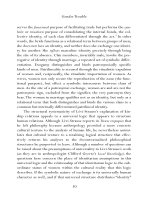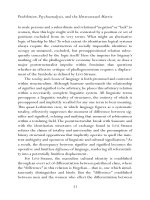GENDER TROUBLE 137
Bạn đang xem bản rút gọn của tài liệu. Xem và tải ngay bản đầy đủ của tài liệu tại đây (20.25 KB, 1 trang )
Gender Trouble
libidinal multiplicity within the very terms of culture, more precisely,
within poetic language in which multiple meanings and semantic nonclosure prevail. In effect, poetic language is the recovery of the maternal body within the terms of language, one that has the potential to
disrupt, subvert, and displace the paternal law.
Despite her critique of Lacan, however, Kristeva’s strategy of subversion proves doubtful. Her theory appears to depend upon the stability and reproduction of precisely the paternal law that she seeks to
displace. Although she effectively exposes the limits of Lacan’s efforts
to universalize the paternal law in language, she nevertheless concedes
that the semiotic is invariably subordinate to the Symbolic, that it
assumes its specificity within the terms of a hierarchy immune to challenge. If the semiotic promotes the possibility of the subversion, displacement, or disruption of the paternal law, what meanings can those
terms have if the Symbolic always reasserts its hegemony?
The criticism of Kristeva which follows takes issue with several
steps in Kristeva’s argument in favor of the semiotic as a source of
effective subversion. First, it is unclear whether the primary relationship to the maternal body which both Kristeva and Lacan appear to
accept is a viable construct and whether it is even a knowable experience according to either of their linguistic theories. The multiple
drives that characterize the semiotic constitute a prediscursive libidinal economy which occasionally makes itself known in language, but
which maintains an ontological status prior to language itself. Manifest
in language, in poetic language in particular, this prediscursive libidinal
economy becomes a locus of cultural subversion. A second problem
emerges when Kristeva argues that this libidinal source of subversion
cannot be maintained within the terms of culture, that its sustained
presence within culture leads to psychosis and to the breakdown of
cultural life itself. Kristeva thus alternately posits and denies the semiotic as an emancipatory ideal.Though she tells us that it is a dimension
of language regularly repressed, she also concedes that it is a kind of
language which never can be consistently maintained.
102









